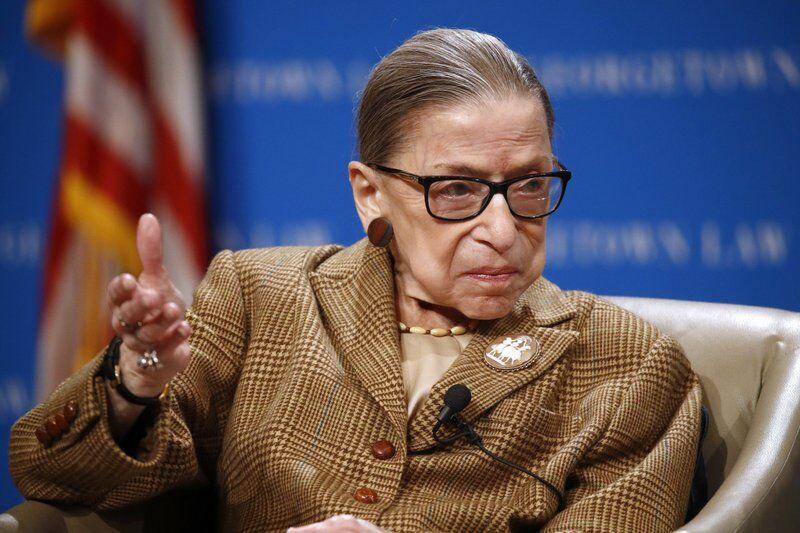Seventy years ago, Ruth Bader Ginsburg was in her first year of college.
She would go on to lead a remarkable life, one rich with achievement and influence. As an attorney for the American Civil Liberties Union she would champion gender equality in the U.S., arguing case after case against the arbitrary, archaic gender differences in our country’s legal code.
Eventually, she would become the second woman appointed to the Supreme Court of the United States, where she voiced opinions and dissents that would echo for generations to come.
In the year 2020, I am now a young woman in my first year of college—just as Justice Ginsburg was all those years ago—and I cannot help but reflect on how distinctly different my world is from that of a young Ruth Bader.
It is the courage of women like Ginsburg that has afforded this generation of women opportunities that were once unimaginable. We chart the progress still yet to be made on the shoulders of the women that came before us.
Her legal platforms—as a majority member and perhaps especially as a dissenter—have been some of the most influential of our lifetimes.
In United States v. Virginia, Ginsburg argued the majority opinion that the Virginia Military Institute’s exclusion of women was unconstitutional, setting a precedent that opened doors for women in the military across the country.
In 2007, she offered a scathing dissent in Ledbetter v. Goodyear Tire and Rubber Company, arguing that discrimination occurs “whenever a paycheck delivers less to a woman than to a similarly situated man.” Ginsburg’s sharp criticism of the Court’s “cramped interpretation of Title VII” inspired the Lilly Ledbetter Fair Pay Act of 2009, which would aim to fight against discriminatory payment practices.
Ginsburg was a woman that spent much of her career in spaces where women were not expected to be. She was soft-spoken, letting her words show their strength in their content rather than their volume.
As a quiet, but opinionated woman, I always admired this about Justice Ginsburg. She proved women do not have to change themselves to succeed in male-dominated areas; or, in a broader context, that one should never change to meet the expectations of others regardless of sex.
Ginsburg serves as an inspiration to young women like myself. Her legacy also tells a deeply American story.
From a modest upbringing in a low-income neighborhood in Brooklyn, Ginsburg defied expectations at every turn. In a life marked with difficulty, Ginsburg was full of an unwavering and profoundly admirable grit.
When both were in law school, Ginsburg’s husband battled with cancer. She took notes for him and dictated his papers as he spoke aloud. After he and their infant daughter went to sleep, she would spend all night completing her own work. Every morning she would get up and do it again.
Ginsburg always spoke of her mother as one of the great role models of her life. She died when Ginsburg was a senior in high school but left her with a lifetime of inspiration. As a justice, Ginsburg reflected on how remarkable it was that “the difference between a bookkeeper in the garment district and a Supreme Court justice” was but “one generation.”
It is no secret that throughout her time on the bench, Ginsburg struggled with various health complications. At the advice of former Justice Sandra Day O’Connor, Ginsburg “schedule[d] her chemotherapy on Friday,” so that she would “have Saturday and Sunday to get over it” to be back at the Court on Monday.
The sense of responsibility she had for her work was clear, and it is without question that Justice Ginsburg gave all she could for her country even in her final hours.
In a time so fractured by the nastiness of partisan politics, Ginsburg’s friendship with her colleague and ideological opposite, the late Justice Antonin Scalia, was an example to us all. Together they enjoyed operas, regularly putting aside their differences of opinion in the interest of their shared humanity.
Her passing leaves this country with much uncertainty, especially as the Senate has already begun speaking of her replacement. This comes at odds with both the precedent set in 2016 and Ginsburg’s own dying wishes on the matter.
There is no question that great difficulty lies ahead of us. But the most profound lesson Ginsburg leaves behind is that compassionate courage is the greatest asset one can have amid such strife.
There is a strength in kindness that cannot be drowned out by harshness, and there is a power in justice that cannot be satisfied with any amount of partisan rhetoric. May this nation follow in her memory as we face the uncertain future.
Claire Sullivan is an 18-year-old coastal environmental science freshman from Southbury, CT.





